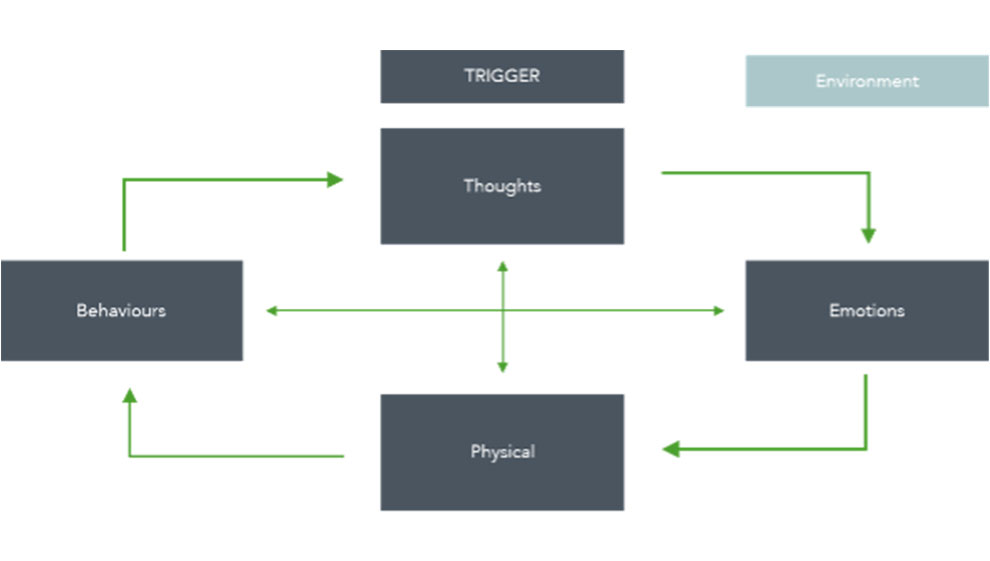What is Cognitive Behavioural Therapy and what will happen in my first session?
If you’re considering starting therapy, firstly well done. There are few decisions that can have such a powerful and life-enhancing impact on your life.
However, the decision to make changes and improve your mental health can also be daunting and confusing. You may be wondering what therapy’s like and what’s expected of you.
First-appointment nerves are totally normal, but it can help to learn what CBT is all about and what it involves, so you’re fully prepared for your first session.
What is CBT?
CBT, or Cognitive Behavioural Therapy, is a psychological therapy or ‘talking therapy’. It’s based on the idea that thoughts, emotions, behaviours and physical symptoms all interact with each other. For example:
- There’s a trigger – You check your inbox and it seems like you have hundreds more emails
- You think – “This is never ending…every day is the same”
- Which changes the way you feel – low, sad, depressed
- Which changes the what you experience physically – you lack energy
- Which changes your behaviour – you isolate yourself from others
- Which changes the way you think – “The days are so empty”
- And you get caught in a vicious cycle
The CBT Model

As you can see, your mental health starts to worsen when these 4 areas interact in unhelpful ways. CBT aims to break the vicious cycle. You and your therapist will work together to design more helpful cycles.
Although we can’t always change life experiences, we can change how we respond to them, and learn how to effectively manage them. Unlike other psychological therapies, CBT is very ‘now focused’ and practical. You’ll eventually learn to become your own therapist so you can prevent problems happening in the future.
There’s lots of evidence showing that CBT is very effective in treating a wide range of issues such as stress, anxiety and depression.
What happens in a CBT session?
If you imagined lying on a sofa in a clinical white room with a motivational quote on the wall like ‘Live…Laugh…Love’, I can tell you it’s not like that. Once we’re able to get back to face-to-face sessions, you’ll be sitting in a private room, on a comfy chair, with your therapist sat opposite you or slightly to the side.
During the pandemic, the majority of sessions are being carried out remotely via a videoconferencing app where you’ll speak to your therapist one on one. There’s lots of evidence, for lots of mental health difficulties, that these sessions are just as effective as face-to-face sessions. Each session, whether remote or face to face, lasts around an hour.
Introductions
Don’t worry, you won’t be expected to dive right in and tell all. Your therapist will introduce themselves, their background and experience, and then ask you some questions about you, such as your preferred name, what you do, who you live with etc.
Setting an agenda
The agenda is a list of what the session will cover – this is so you can get the most from the session. During your first session, the agenda will be set by the therapist, but in future therapy sessions you’ll both set it.
Your first session agenda will look something like this:
- About CBT: An explanation from your therapist about the CBT Model and you’ll be able to ask lots of questions
- About you: A chance for you to describe your problem. Don’t panic, you’ll be guided by your therapist. A good way to think about explaining it is: “I’m feeling different, e.g. sad, depressed and low; I’m behaving differently, e.g. I don’t exercise anymore, I don’t phone my friends and I’m drinking more alcohol; I feel physically different, e.g. I’m not sleeping, my appetite has gone and I keep feeling shaky; and my thinking has changed, e.g. I keep thinking nothing will change and that I’m a failure”. You may also complete a short questionnaire to rate your mood. Many therapists repeat this at the beginning of every session to check the sessions are helping you
- Describing your problems using the CBT model: You and your therapist will start to look at how your problems might fit with the idea of vicious cycles
- Goal setting: An important part of the first few sessions. Step 3 helps you develop an understanding of where you are now, while goal setting gives you a vision of where you want to be, what you want to achieve, and ultimately how you will know that therapy has been effective. For example, if you’re feeling anxious, stressed or low, your goal may be becoming happier or less anxious. Your therapist is trained to help you explore what ‘happier’ or ‘less anxious’ looks like. You’ll also set short-term and long-term goals that are important to you. A short-term goal could be taking a shower and a long-term goal could be returning to work after a long absence
- Discussing coping techniques: Once your therapist has a clearer idea of who you are, where you are and where you want to be, they’ll begin to equip you with practical tools to help you manage your own mental health. This might include teaching you new ways to challenge unhelpful thinking, mindfulness-based techniques, or breathing and relaxation techniques.
Homework
At the end, a therapist will likely set you some tasks to complete before the next session. This might include keeping a diary of your thoughts, feelings and behaviours, practicing a breathing technique, or trying a new experience.
CBT is very practical in nature – so it’s important that you start to integrate your new skills into your day-to-day life. That’s one of the great benefits of starting a course of CBT – the effects aren’t just confined to the session, they impact on your life between sessions. So practicing CBT techniques outside of your sessions will really help you to make the most of your treatment.
Last updated Monday 17 February 2025
First published on Tuesday 18 May 2021

